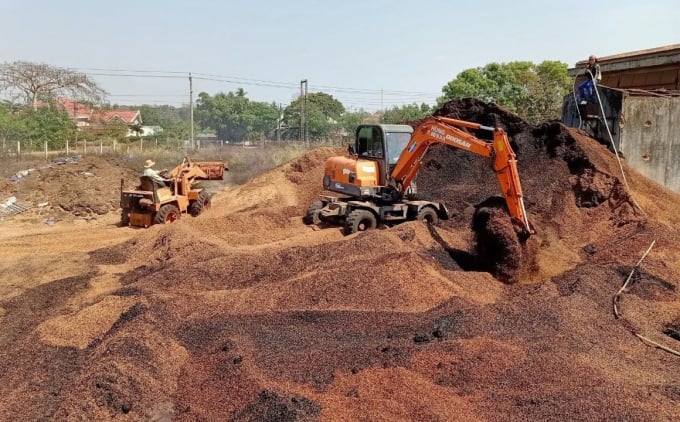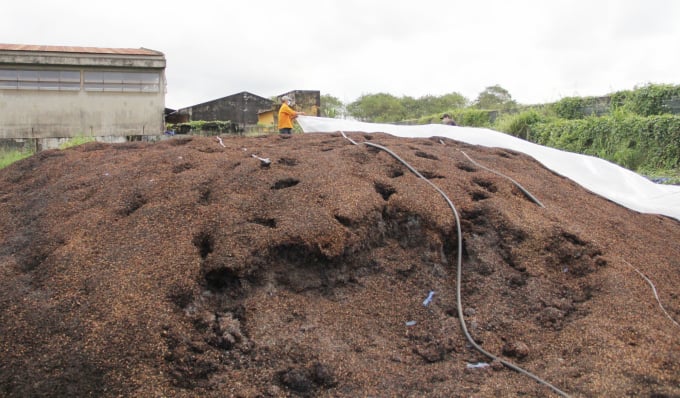June 16, 2025 | 18:38 GMT +7
June 16, 2025 | 18:38 GMT +7
Hotline: 0913.378.918
June 16, 2025 | 18:38 GMT +7
Hotline: 0913.378.918

The Western Highlands Agriculture and Forestry Science Institute (WASI) mixes coffee husks with probiotics and other components to compost. Photo: Quang Yen.
The Central Highlands’ steeply dissected terrain combined with unreasonable and improper land exploitation by the people has made the productivity of the soil severely decreased, particularly in organic matter content and fertility. This also results in the degradation of the soil structure.
The essential role of organic fertilizers becomes more visible than ever, especially in maintaining soil fertility, stabilizing crop yields, and contributing to the sustainability of agricultural production.
However, organic fertilizer from livestock waste is increasingly scarce at present, not enough to meet the agricultural cultivation demand in the Central Highlands. Coffee husks, on the other hand, come out as a precious organic source, readily available and cost-friendly.
The Central Highlands produce approximately one million tons of coffee husks every year - an enormous source of raw materials that can be processed into organic fertilizers for reproduction or become raw material for mushroom cultivation.
In fact, according to recent studies, many units, businesses, and people in the Central Highlands have well-utilized over 90% of coffee husks produced to make organic fertilizer.
The only expenses are labor, coffee husks, money to buy probiotics, manure (if lacking), and granulated sugar. From there people can produce bio-organic fertilizers of good quality while the cost is only 30% of the same type of fertilizer sold on the market.

After evenly mixing the components, the compost will be covered with tarpaulin to decay. Photo: Minh Hau.
Mr. Le Van Hung (living in Hoa Thang commune, Buon Ma Thuot city, Dak Lak) said that microbial organic fertilizers are produced by utilizing post-harvest coffee husks. The waste will be taken to compost then brought back to fertilize the coffee plants, providing a sufficient amount of nutrition.
“The application of coffee-organic fertilizer can help farmers make full use of the waste products from coffee cherries. This greatly saves investment capital for the garden and helps the garden achieve good growth and high yield," said Mr. Hung.
Mr. Tran Dinh Trong, Director of Eatu Fair Services and Agricultural Cooperative (Buon Ma Thuot city, Dak Lak) shares the same opinion. Using coffee husks to make organic fertilizer is a good idea which benefits the soil and plant immensely.
We currently have a factory producing organic fertilizers using coffee husks which can ensure the caring process for the coffee area of the institute (more than 50 ha). WASI is a pioneer in utilizing all by-products of coffee to produce microbial organic fertilizers. Thanks to organic fertilizer made from coffee husks the unit can save about 10-15% of the amount of fertilizer essentially used for plants.
(Dr. Phan Viet Ha, Deputy Director of WASI)
Soil restoration is being carried out in a positive direction
Having a conversation with the reporters from Vietnam Agriculture News (VAN), Dr. Phan Viet Ha, Deputy Director of the Western Highlands Agriculture and Forestry Science Institute (WASI), said that people had started using coffee husks to make organic fertilizer since about 10 years ago.
The nutritional value in coffee husks used to receive little attention. But research has shown that the nutritional content in coffee husks is very high and by no means inferior to other top-quality manures on the market today.
Dr. Ha added that using completely composted coffee husks can help farmers save 10-15% of the fertilizer costs. Applying organic fertilizer to the soil will improve fertilizer use efficiency. The plants will absorb more nutrients when later being applied chemical fertilizers.
Mr. Ha remained firm upon saying organic fertilizers cannot replace chemical fertilizers.
“When it comes to farming practices in Vietnam, yield is still a priority. Therefore people who apply organic fertilizers only will not be able to satisfy the requirement. But organic fertilizer made from coffee husks can indeed replace 10-15% of existing chemical fertilizers thanks to its advantage of greatly improving the soil quality,” he said.
The current cultivation land in the Central Highlands has degraded a lot. Applying organic fertilizer made from coffee husks will help improve the soil and increase the effectiveness of chemical fertilizers for coffee and other crops. Since it is a microbial organic fertilizer, many helpful microorganisms will be provided to the soil, resulting in plants becoming more resilient to soil-borne diseases.
Translated by Samuel Pham
![Turning wind and rain into action: [4] Bringing climate bulletins to remote and isolated areas](https://t.ex-cdn.com/nongnghiepmoitruong.vn/608w/files/linhnhp/2025/06/14/1152-z6704423696987_15fd32ffc26d590d204d520c9dac6786-nongnghiep-151141.jpg)
(VAN) The Vietnam Agriculture and Nature Newspaper interviewed Mr. Vu Thai Truong, Acting Head of Climate Change and Environment at UNDP Vietnam, to gain deeper insight into how climate bulletins are delivered to farmers.

(VAN) In Tien Giang, a high-tech shrimp farm has developed a distinctive energy-saving farming model that has yielded promising results.
![Turning wind and rain into action: [3] 300.000 farmers benefit from agro-climatic bulletins](https://t.ex-cdn.com/nongnghiepmoitruong.vn/608w/files/news/2025/06/12/e5a48259d6a262fc3bb3-nongnghiep-125122.jpg)
(VAN) The agro-climatic bulletin has become a valuable tool for farmers in the Mekong Delta. After more than five years of implementation, the initiative is gradually being expanded nationwide.
![Turning wind and rain into action: [2] Providing forecasts to the people](https://t.ex-cdn.com/nongnghiepmoitruong.vn/608w/files/news/2025/06/12/e5a48259d6a262fc3bb3-nongnghiep-103927.jpg)
(VAN) In addition to improving the quality of hydrometeorological forecasts, putting forecast bulletins into practical use is crucial for production and disaster prevention.

(VAN) Blue carbon is receiving attention for its rapid absorption capacity and vast potential. It represents a promising nature-based solution to respond to climate change.
/2025/06/11/3507-1-161904_583.jpg)
(VAN) Seagrass beds and coral reefs serve as 'cradles' that nurture life in the ocean depths, creating rich aquatic resources in Vietnamese waters.
![Turning wind and rain into action: [1] Forecasting for farmers](https://t.ex-cdn.com/nongnghiepmoitruong.vn/608w/files/news/2025/06/11/e5a48259d6a262fc3bb3-nongnghiep-111919.jpg)
(VAN) Weather is no longer just a matter of fate. Forecasts have now become an essential companion for farmers in every crop season.